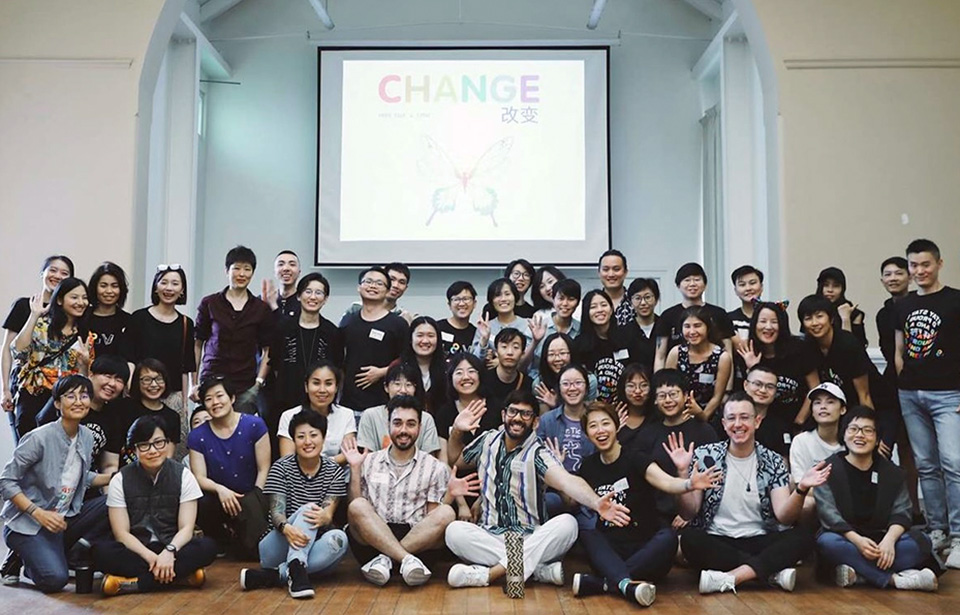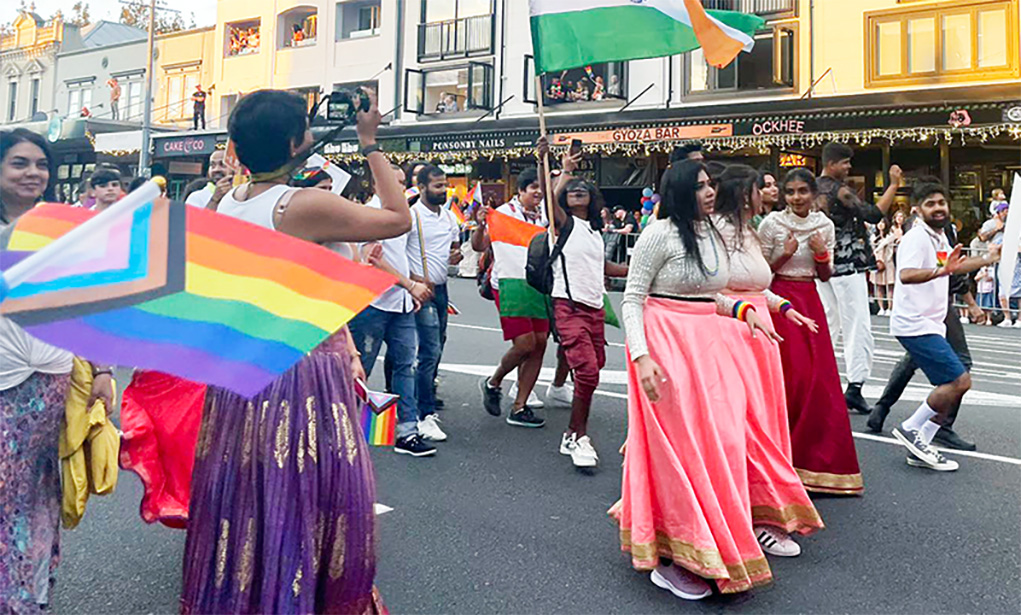Rainbow Chinese face invisible discrimination in New Zealand
• July 20, 2023

Members of the China Pride NZ group. Photo: supplied
Members of the Chinese Rainbow community in New Zealand say they are struggling to speak up for their rights and are being invisibly discriminated against.
Attitudes in Chinese communities towards the Rainbow community could be at odds with mainstream New Zealand values around sexual orientation, they told TWN.
Compared to a harsher social environment for gay people in China, New Zealand is more inclusive and open, and was one of the first countries in the world to legalise same-sex marriage.
However, according to a 2020 Six Tone article by PhD student Cui Le, when he arrived in New Zealand, he still had to “hide in the closet” because of discrimination within the local Chinese community.
Several gay Chinese individuals told Te Waha Nui of feeling different in the eyes of the Chinese community here.
They say this discrimination is often invisible and subtle, leading to resentment and self-censorship by Rainbow community members, with no outlet to express their feelings.
Alex Li, who witnessed strong hostility towards homosexuality among her classmates and elders in China, chose to come to New Zealand in 2016.
“Here, I can marry a girl, so I thought I must obtain New Zealand citizenship,” she said.
However, within the Chinese community in New Zealand, she says she has also met a lot of animosity.
The discrimination can but subtle and was often difficult to prove, she said.
“I once rented a house from a Chinese landlord who, upon learning that I was gay, went around his restaurant saying, ‘A lesbian has come to my house.’
“At night, he eavesdropped on my phone conversations with my girlfriend,” Alex said.
Xiong Sijie, who arrived in New Zealand in 2018, said she had had similar experiences.
She and her Chinese landlord were in a legal hearing over a housing dispute, when the landlord accused Xiong of having an emotional breakdown due to a fight with her partner rather than an issue with property.
Xiong says she suddenly added: “Her partner is a girl.”
“The landlord didn’t explicitly express discrimination, but her implication was clear.
“She thought my lesbian identity was something very shameful, and she wanted to use it to attack me in court,” Xiong said.
According to our interviewees’ feedback, they or their friends have met situations where Chinese landlords refused to rent to them because they belong to the LGBTQI+ community.
Xiong said she would then subconsciously conceal her identity as a lesbian and never thought about how or through which channels to defend her rights.
Xiong and Shu Wang, both bisexual, said they and their friends frequently met elderly Chinese who insisted on introducing potential male partners to them.
“Why do they assume that I must be interested in men? How can they not know that there are many homosexuals in New Zealand and still try to match me with boys?" said Xiong.
“I got angry at that time, but those old people completely failed to understand my anger and even joked about it."
She was advised by Chinese friends to remove the mention of her homosexuality from her resume.
Alex once referred a gay friend for a job, only for the employer to call her and ask, “Is that person a lesbian? Why is her hair cut so short?”
“The employer didn’t explicitly discriminate against lesbians, but his implication was that ‘lesbians are different’, which made both me and my friend uncomfortable,” Alex said.
Wang studied at the University of Auckland and now lives in Wellington.
She says she met many Chinese students who considered homosexuality a big issue and constantly discussed it. They made her annoyed and angry.
They lacked basic knowledge and understanding of the Rainbow community, appearing rude and ignorant, she said.
The students did not have access to New Zealand’s mainstream values, so their attitudes towards homosexuality were the same as in China, said Shu.

After a sharing session, CPNZ members take a photo with the guest speakers. Photo: Instagram
China Pride NZ (CPNZ) is the only Chinese Rainbow organisation in New Zealand. Due to the pandemic, it ceased operations in the summer of 2021 and has only held a few small internal events recently.
One of the organisers, Shu said CPNZ aspired to become a platform through which the Chinese Rainbow community in New Zealand could voice its concerns.
However, maintaining the organisation, which had had a high turnover of members recently, required a significant amount of work for volunteers, she said.
Without enough promotion, many newly arrived Chinese were unaware of its existence, Shu acknowledged.
“In our social media group of over 500 people, the members know each other, so CPNZ events usually have active participants.
“I think our community remains relatively closed. Many newly arrived Chinese people want to find an organisation. To some extent, we have overlooked them.”
Chance Wang, a Chinese gay man who arrived for work in October last year, said he was not sure how to connect with the Chinese Rainbow community in Auckland.
Xiong said she saw the Indian Rainbow community during the 2021 Auckland Pride and felt envious. “I hope that one day Chinese can also appear in the parade,” said Xiong.
Xiong said there was no channel for self-expression available.
“Outside my social circle, I am unable to know how other Chinese Rainbow people are doing,”

The Indian Rainbow team at the 2021 Auckland Pride Parade. Photo: supplied.
While taking part in the Auckland Pride Festival, Shu received a warm welcome from the organisers who had not had Chinese culture-based participants before.
“I realised we need to unite with our peers and bravely step out, daring to speak up for the Chinese Rainbow community and express our struggles to the public. It is necessary,” she said.
Alex says the issue is often overlooked and forgotten.
“The voice of the Chinese community is too small, and there are too few Chinese willing to come out and speak against this discrimination. We lack the spirit to speak out,” Alex said.
Alex said that even with China Pride NZ, more needed to be done.
“We need a real interface that can provide practical assistance, just like calling an ambulance when you’re injured. We need effective and efficient help to fight for our rights.”
Alex said constant and powerful advocacy was crucial.
“Just like my colleagues’ mothers, can you imagine that in their generation, New Zealand women didn’t have the right to work and only stayed at home as wives and mothers?
“It took many people’s efforts to bring about the New Zealand we have today.
“So, regarding the discrimination faced by the Chinese Rainbow community, if more people speak up, the situation will surely improve.”

Whakatairanga ka tika, whakamaua ngaa mita
AISHA CAMPBELL (NGĀTI RUANUI, NGĀ RAURU, NGĀ RUAHINE, TE ATIAWA, TARANAKI) • October 28, 2025

Supporters hope new council will save Western Springs Speedway
Savannah Lendich Jonkers • October 8, 2025


Whakatairanga ka tika, whakamaua ngaa mita
AISHA CAMPBELL (NGĀTI RUANUI, NGĀ RAURU, NGĀ RUAHINE, TE ATIAWA, TARANAKI) • October 28, 2025

Supporters hope new council will save Western Springs Speedway
Savannah Lendich Jonkers • October 8, 2025
